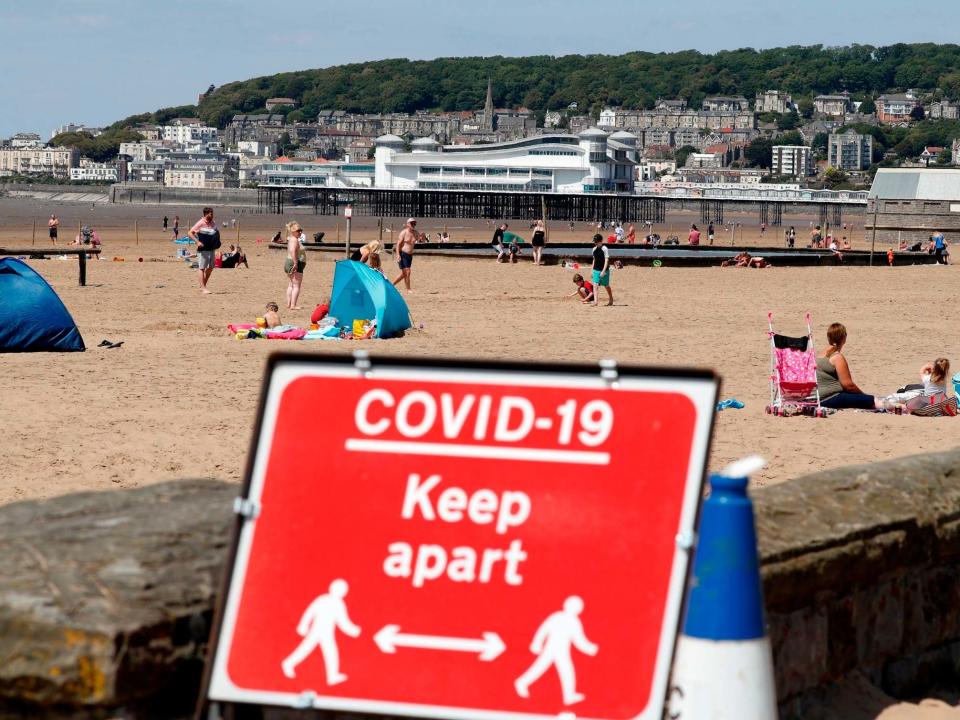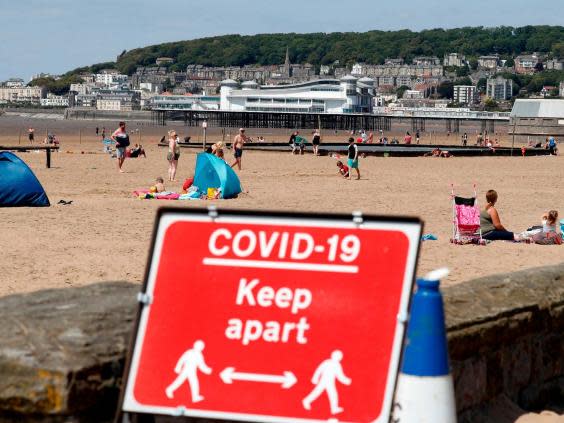Coronavirus: New lockdown laws in England make it illegal for couples living apart to have sex indoors

New coronavirus laws in England have made it illegal for couples who live in different homes to have sex indoors and stay overnight.
The Health Protection Regulations previously banned people leaving home without “reasonable excuse”, but the provision has been replaced by stringent curbs on where people can sleep and gather together.
The law, which will be laid in parliament on Monday, says: “There is a gathering when two or more people are present together in the same place in order to engage in any form of social interaction with each other, or to undertake any other activity with each other.”
While the powers are in force, “no person may participate in a gathering which takes place in a public or private place outdoors, and consists of more than six persons, or indoors, and consists of two or more persons”.
A separate provision makes it illegal to stay overnight outside your home “without reasonable excuse”, which can include moving home, work, attending funerals, providing care and escaping harm.
An exception has not been made for couples who do not live together, meaning that they can spend time together outdoors but not inside.
Police can arrest or fine people for breaking the law, with the default penalty standing at £100 in England, but do not have the power to check for violations inside properties.
Adam Wagner, a human rights barrister at Doughty Street Chambers, said the issue highlighted how the UK’s coronavirus lockdown had “effectively restricted ordinary contact by people in relationships who do not live together”.
“This is a significant restriction on our rights to privacy and family life, even though it may be justified by the severity of the public health risk,” he told The Independent.
“Now, as the lockdown is lifting, the regulations have become stricter about what we can do with other people in our own household.
“And the definition of ‘gathering’ is so wide it could encompass any kind of human activity, including sex.
“This may be an unintended consequence of the change, but it will affect many thousands of people and the government should urgently consider whether an exception should be made for people in relationships.”
At the start of the lockdown, government ministers and officials explicitly banned couples who did not live together from meeting.

At a press briefing on 24 March, the deputy chief medical officer suggested they should move in together if they wanted to continue seeing each other.
Jenny Harries said: “The issue here is that we do not want to have people switching in and out of households. It would defeat the purpose of the reduction in social interactions and would allow transmission of disease.”
At the time, Matt Hancock said people should “make the choice and stick with it”.
Last month, Professor Neil Ferguson resigned from the Scientific Advisory Group for Emergencies after conceding he made an “error of judgment” when a lover visited his home.
Prof Ferguson had not broken the law as it stood at the time and although the woman who visited him may have, police took no further action.
The main provision of the Health Protection Regulations previously made leaving home or being outside “without reasonable excuse” illegal, but it has been replaced with a prohibition on staying outside the home.
The new law contains a long list of exemptions, including for “elite athletes” and their teams who need to train elsewhere and for children whose parents are separated.
Legal restrictions on gatherings have been brought in line with government guidance to mean that up to six people can meet in public places or private gardens.
New police guidelines published by the College of Policing on Monday state that in England, “a person may now leave and remain outside of the place where they live for any reason, however, they are required to stay at the place where they are living overnight”.
Officers were told that they can direct people to return home or disperse illegal gatherings in private homes or gardens, but they cannot physically remove people or use force unless they are in a public place.
Fines and arrests can still be used as a last resort if people are breaking the law and refuse to comply voluntarily.
Under the new law, places of worship and community centres will be allowed to provide early years childcare, which has been defined in law.
Model villages, social clubs, zoos and aquariums, visitor attractions at farms and “indoor attractions” have been added to the list of businesses that must stay shut.
At the same time, amenities for outdoor sports including watersports centres, stables, shooting and archery venues, golf courses and driving ranges have been allowed to reopen alongside outdoor markets and vehicle showrooms.
The law in England does not enforce government guidance on social distancing.
Almost 17,000 fines had been handed out by police in England and Wales by 25 May.
Provisional statistics show the penalties have been racially disproportionate and suggest a “postcode lottery” of enforcement between different police force areas.
A letter sent to the health secretary by a group of human rights organisations has called for immediate changes to ensure measures “do not discriminate against communities of colour”.
“As the government has started to ease restrictions – and the rules made so broad as to be effectively unenforceable – the police’s enforcement powers have been ramped up,” said the letter.
“The combination of increasingly vague police powers and heightened fines may pose an even more pernicious combination for people of colour and public health.”
Read more
Seven charts that show the true scale of the UK coronavirus outbreak
‘They can blame it for everything’: What coronavirus means for Brexit
The Americans who think that coronavirus is a hoax
Do you need a face mask and where can you buy one?
UK lockdown: Can I see my family and friends under new rules?
What is stage two of lockdown and which rules have changed?
Coronavirus powers ‘must be narrowed to stop race disproportionality’
Nearly 17,000 fines issued for alleged lockdown breaches

 Yahoo News
Yahoo News 